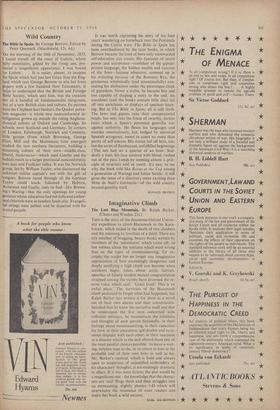Wild Country
'ON the morning of the 10th of November, 1835,
found myself off the coast of Galicia, whose lofty mountains, gilded by the rising sun, pre- sented a magnificent appearance. I was bound for Lisbon . . . It is easier, almost, to imagine the Spain which had just lost Goya than the Eng- land which sent George Borrow to win her from Popery with a few hundred New Testaments. It helps to understand that the British and Foreign Bible Society, which sent him, was the creation not of a handful of fundamentalist clergymen, but of a new British class and culture. Its patrons were the Clapham Sect bankers, the Quaker porce- lain magnates—a whole new noncomformist in- telligentsia grown up outside the ruling Anglican- classical culture of Oxford and Cambridge. Its schools were Scotland and Germany. In corners of London, Edinburgh, Norwich and Coventry, little groups (from which Browning, George Eliot, Mill and the Martineaus later emerged) studied the new northern literatures, building a dissenting culture of their own—middle-class, liberal, biedermeier—which used Goethe and the ballads much as a larger provincial nonconformity uses jazz and Faulkner today. It was the Norwich group, led by William Taylor, who discovered the unkempt militia captain's son with the gift of tongues. Borrow raced through all the German Taylor could teach, followed by Hebrew, Armenian and Gaelic, only to find—like Brown- ing's Waring—that the only openings for young geniuses whose education had not followed author- ised channels were in heathen lands afar. Evangeli- cal strings were pulled, and he departed with his crated gospels. It was worth reprinting his story of his four years' wandering on horseback over the Peninsula during the Carlist wars. The Bible in Spain has been overshadowed by the later books, in which Borrow became the kind of bore only unrewarded self-education can create. His fantasies of secret power and acceptance—confidant of the gipsies' private language, the hidden wealth and rancour of the Jews—became obsessive, summed up in his irritating persona of the Romany Rye, the gentleman whimsically (and unsuccessfully) con- cealing his distinction under the picaresque cloak of gipsydom. Never a stylist, he became less and less capable of shaping a story to the end; his anecdotes (and the books contain little else) tail off into anticlimax or displays of specious learn- ing. But in The Bible in Spain, all is still fresh. The Jews and gipsies raise their conspiratorial heads, but only into the frieze of swarthy, furtive faces which is Spain's perennial guerrilla war against authority. He flexes his languages and muscles ostentatiously, but, hedged by universal Spanish arrogance, seems to assert no more than parity of self-esteem. His stories tail off here, too, but the series of flamboyant, unfulfilled beginnings (The sun had set a quarter of an hour. Sud- denly a man, his face covered with blood, rushed out of the pass.') ends by seeming almost a prin- ciple of structure and of youth. It's easy to see why the book sold like Room al the Top among a generation of Warings and Julien Sorels: it still gives the sense of a discovery more exciting than Mme de Stael's Germania—of the wild country beyond gentility itself.
RONALD BRYDEN






































 Previous page
Previous page